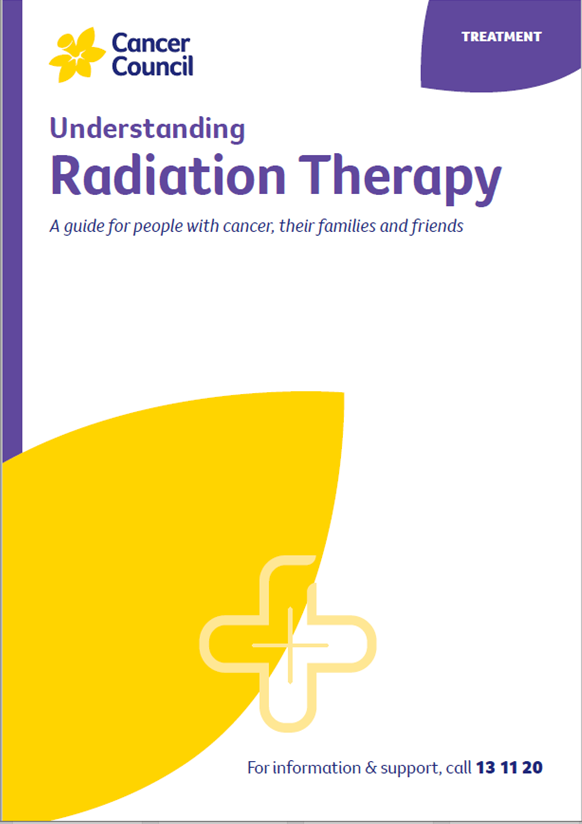- Home
- About Cancer
- Cancer treatment
- Radiation therapy
- External beam radiation therapy (EBRT)
- What to expect at treatment sessions
What to expect at treatment sessions
Below is a description of what to expect at EBRT treatment sessions.
Learn more about:
- Preparing for treatment
- Positioning you for treatment
- Receiving the treatment
- Keeping still
- How long will it take?
- Managing discomfort
- Taking safety precautions
- After the treatment session
- Managing anxiety before and during EBRT
- Podcast: Meditation and Relaxation
Preparing for treatment
You will usually start radiation therapy a few days or weeks after the planning session. Your treatment team will let you know what time to arrive and how long you will need to be in the radiation therapy department. There will be at least 2 radiation therapists at each treatment session. You may be asked to change into a hospital gown and remove any jewellery before you are taken into the treatment room.
Positioning you for treatment
The treatment room may be in semi-darkness so the therapists can see the light beams from the treatment machine and line them up with the tattoos or marks on your body or mask.
After the radiation therapists position you on the treatment couch, they will leave the room to take some imaging scans using the imaging device attached to the treatment machine. They will check the scans and make any adjustments needed to make sure you are in the same position as you were during the planning session. This may mean moving the table from outside the room or coming back into the room to move your body.
Receiving the treatment
Once you are in the correct position, the radiation therapists will control the treatment machine from a nearby room. They can see you on a television screen and you can talk to them over an intercom. The lights can be on during treatment.
The machine will move around you but it will not touch you. You won’t see or feel the radiation but you may hear a buzzing noise from the machine while it is working and when it moves.
The radiation therapists may turn off the machine and come into the room to change your position or adjust the machine.
Keeping still
It is important to stay very still to ensure the treatment targets the correct area. The radiation therapists will tell you when you can move. You will usually be able to breathe normally during the treatment. For treatment to some areas, such as the chest, you may be asked to take a deep breath and hold it while the radiation is delivered.
How long will it take?
The treatment itself takes only a few minutes, but each session of EBRT may last around 10–40 minutes because of the time it takes the radiation therapists to set up the equipment, place you into the correct position and do the imaging scans. The first session may take longer while checks are performed. You will be able to go home once the session is over.
Managing discomfort
EBRT is painless and you won’t feel it happening. If you feel discomfort when you’re lying on the treatment table, tell the therapists – they can switch off the machine and start it again when you’re ready. If you’re in pain because of the position you’re in or because of pain from the cancer, talk to the radiation oncology nurse. They may suggest you take pain medicine before each session.
Some people who have treatment to the head say they see flashing lights or smell unusual odours. These effects are not harmful, but tell the radiation therapists if you have them.
Taking safety precautions
EBRT does not make you radioactive because the radiation does not stay in your body after each treatment session. You will not need to take any special precautions with bodily fluids (as you would with chemotherapy). It is safe for you to be with other people, including children and pregnant women, and for them to come to the radiation therapy centre with you. However, they cannot be in the room during the treatment.
After the treatment session
You will see the radiation oncologist, a registrar (a hospital doctor training to be a radiation oncologist) or a radiation oncology nurse regularly to check your progress and discuss any side effects.
Managing anxiety before and during EBRT
The radiation therapy machines are large and kept in an isolated room. This may be confronting, especially at your first treatment session.
You may feel more comfortable as you get to know the staff, procedures and other patients.
If you are having radiation therapy for a head and neck or brain cancer, you may have to wear a plastic mask made of tight‑fitting mesh. Wearing the mask makes some people feel anxious or claustrophobic.
Tell the radiation therapists if you feel anxious or claustrophobic before or during treatment. With the support of the radiation therapy team, many people find that they get used to wearing the mask.
The team may suggest you try breathing or relaxation exercises, or listening to music to help you relax. A mild sedative may also help.
For more on this, see Emotions and Cancer or listen to our podcast, Finding Calm During Cancer.



Your radiation therapy team will provide support
Many people get used to
wearing a mask
Breathing or relaxation exercises may help
Podcast: Meditation and Relaxation
→ READ MORE: Imaging scans you may have
More resources
A/Prof Susan Carroll, Senior Staff Specialist, Radiation Oncology, Royal North Shore Hospital, and The University of Sydney, NSW; Katie Benton, Advanced Dietitian Oncology, Sunshine Coast Hospital and Health Service, QLD; Adrian Gibbs, Director of Physics, Radiation Oncology, Princess Alexandra Hospital Raymond Terrace, QLD; Sinead Hanley, Consumer; Dr Annie Ho, Radiation Oncologist, GenesisCare, Macquarie University Hospital and St Vincent’s Hospital, NSW; Angelo Katsilis, Clinical Manager Radiation Therapist, Department of Radiation Oncology, Royal Adelaide Hospital, SA; Candice Kwet-On, 13 11 20 Consultant, Cancer Council Victoria; Jasmine Nguyen, Radiation Therapist, GenesisCare Hollywood, WA; Graham Rees, Consumer; Nicole Shackleton, Radiation Therapist, GenesisCare Murdoch, WA; Dr Tom Shakespeare, Director, Cancer Services, Mid North Coast Local Health District, NSW; Gabrielle Vigar, Nurse Lead, Cancer Program, Royal Adelaide Hospital and Queen Elizabeth Hospital, SA.
View the Cancer Council NSW editorial policy.
View all publications or call 13 11 20 for free printed copies.

